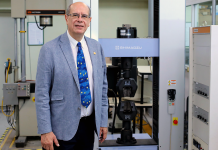
Why is the role of field service engineer a crucial part of the services Ipsen offers?
For me, field service is paramount because from the time that equipment leaves our facility until the time it’s taken out of service, field service engineers, in many ways, become the face of Ipsen, they are the conduit by which we keep in contact with our customers and how we ensure our customers remain happy.
Having well-rounded and trained technicians is crucial to Ipsen to ensure that we, one, keep our customers happy, but two, really keep our furnaces running as they should over the many, many thousands of cycles in their lifetime.
What makes Ipsen’s field service engineers superior to your competitors?
One: sheer volume. We have more technicians across the world than any of our competitors, and they’re Ipsen employees. They’re not third parties; they’re not other people that work for Ipsen; they are Ipsen employees out there fixing our furnaces.
That gives us the ability to do quality control. We have the ability to really hold onto our technicians. Many of them have worked for us for up to 30 years. That’s a significant amount of vacuum furnace knowledge — and not just Ipsen knowledge, but all of the brands out there. If a customer calls us, and if they happen to have competitor furnaces, we’re able to maintain, support, and repair those, too.
Our newer technicians always have somebody they can rely on to help them if they’re getting a little stuck in some process, which is a huge benefit.
What new initiatives have you implemented for the hiring and training of field service engineers?
We recently launched the TDC — the Ipsen Technical Development Center. It’s a highly-intense, six-month program. We’re hiring field service engineers (FSEs), and we’re giving them time to prove themselves in the field for a short period of time, and then we enter them into the technical development center.
Over six months, they’ll be trained on all aspects of the furnaces, whether it’s here in our Cherry Valley facility or on hot zones or in our Souderton, Pennsylvania, facility. They’re learning a block of knowledge, and then go into the field and use that knowledge to prove they’re capable of doing what they just learned and developing them into Ipsen FSEs.
We’ve invested a lot from not just a manpower perspective in hiring with this first group of a half dozen technicians, but by having those technicians go through this whole program, it’s an investment from the organization to make sure we’re developing and delivering high-quality technicians to the field.
Parts inventory, ordering, and shipping processes can often be complicated, and challenges can cause potential delays in customer service. What has Ipsen done to make these areas more efficient?
When I came here three years ago, there were two things I realized we really needed to work on: One was focusing on getting the right amount of people to support our customers’ demands and to establish new roles to better support our customers in the future.
Another piece of the parts organization we have focused on is looking at process improvements and improving our digital tools to better support our customers. Kaizen events drive overall process improvements, foster internal communication and help drive process efficiencies, in this case specifically looking at the end-to-end order process and improving many facets of that process.
From a digital perspective, we implemented a new customer portal, which is live, and we’re expanding that pretty rapidly throughout the entire customer base. They’re able to log in and make service and parts requests and easily interact with Ipsen. We also implemented a new call routing software so customers can more easily contact who they need and when they need them and a new case management software to better track parts orders through the process.
You recently expanded your aftermarket team. What made that move necessary?
We’re changing our mentality on how we support our customers, and we’re trying to support our customers at an even higher level than we’ve done in the past. We’ve launched four HUBs to date: in the Midwest and Southeast. With those HUBs, we’re purposefully increasing the staffing of our field service engineers and focusing on significantly improving our response times to customers, so you don’t have to wait a week to get an Ipsen FSE. The wait should be, at most, 24 hours.
Additionally, we expanded our service administration team and continue to expand it. Instead of having one or two service administrators overseeing all service requests, now we have service administrators overseeing designated HUB areas to ensure a high level of support. We’ve grown significantly over the last three years, and that trajectory is not going to stop.
What has been the customer response to these service changes?
The response from the customers that have HUBs in their areas has been very, very strong. We do annual customer service surveys, but the initial response is our parts group is getting back to them faster; our service team is responding better.
MORE INFO ipsenglobal.com


























